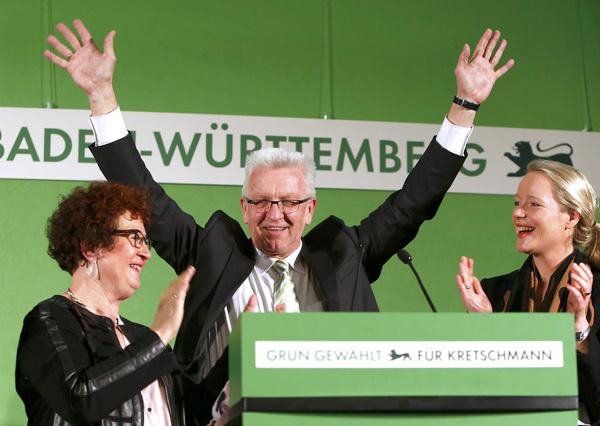German voters batter Merkel over migrant policy
(Agencies) Updated: 2016-03-14 08:47
|
 |
|
State Premier Winfried Kretschmann of the Greens (Die Gruenen) party is applauded by his wife Gerlinde (L) as he celebrates following first exit polls in the state election in Baden-Wuerttemberg in Stuttgart, Germany, March 13, 2016. [Photo/Agencies] |
AFD RIDES HIGH
With a high turnout in all the votes, the AfD, already represented in five of Germany's 16 regional assemblies, succeeded in entering three more.
Its support was strongest in Saxony-Anhalt, where it grabbed 24.2 percent of the vote behind a diminished CDU showing, surpassing even the Social Democrats (SPD), Merkel's coalition partner in Berlin, ZDF television projections indicated.
With campaign slogans such as "Secure the borders" and "Stop the asylum chaos", it was the first time the AfD had come as high as second in any state.
"We have fundamental problems in Germany that led to this election result," said AfD chief Frauke Petry.
The AfD's rise, which has coincided with strong gains by other European anti-immigrant parties including the National Front in France, punctures the centrist consensus around which the mainstream parties have formed alliances in Germany, and may embolden more European leaders to challenge Merkel on the migrant issue.
The CDU's leader in Saxony-Anhalt pointed the finger squarely at Merkel for his party's losses.
"The issue that has brought the AfD into parliaments across Germany can't be ignored on a federal level any more. We need solutions," Reiner Haseloff told ARD television.
Charlotte Knobloch, former head of Germany's Central Council of Jews, bemoaned a "massive shift to the right".
"If voters follow the call of right-wing populists and extremists to such an extent, it is a failure of the democratic parties," she said.






